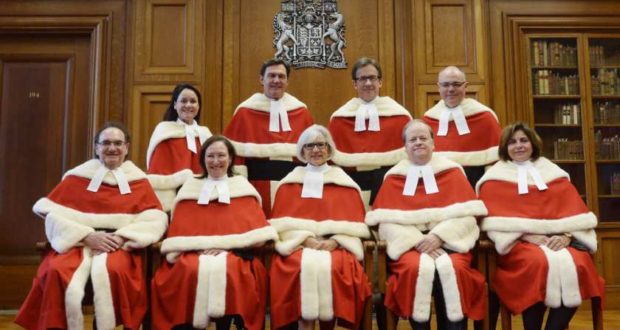Maxime St-Hilaire is a Professor at the Faculty of Law, University of Sherbrooke. The following article is Professor St. Hilaire’s response to the question asked by the organizing committee of the Supreme Court of Canada Symposium: “In your opinion, what is the most important challenge facing the Supreme Court of Canada in the coming decades, and might it meet this challenge?”
The greatest challenge facing the Supreme Court of Canada is the risk of its politicization, understood here as a form of adjudicative practice that is not governed by legal rules, legal principles, or other legal norms and that does not restrict itself to deciding justiciable questions.
Let’s start with the question of judicial appointments. As I have explained elsewhere, “it’s relevant to keep in mind that a country may well opt for greater conformity of its constitutional appointments to global standards relating to judicial appointments, either through a direct appointment system or under the direct appointment aspect of a hybrid system, especially a country with a generalist supreme court, where the very idea constitutional justice is well established, and with a strong tradition of judicial independence.“ That is why the “new selection process” of Supreme Court candidates, which includes a form of parliamentary consultation, albeit a weak one, signals a regression. Normally, it is in the opposite direction that progress is made, from more political criteria to increasingly professional criteria in the selection of those who are ultimately responsible for the judicial review of constitutional conformity. Indeed, this is only one among several vectors of politicization in this new process. Others include the composition of the Independent Advisory Committee; a newly-introduced criterion, for potential judicial appointments, for demonstrating the “[a]wareness of, and ability to synthesize information about, the social context in which legal disputes arise“; and the very idea that a judge may have to account for the decisions she rendered or in which she took part other than through the reasons for judgment.
The specter of the Court’s politicization is also what lies behind the apparent formalization of the so-called “living tree” method of constitutional interpretation. Note that the “living tree” dogma insists upon a strictly evolutionary reading of the metaphor. It ignores the fact that the legal possibility of any evolutionary interpretation is conditional on the existence of limits specific to a “natural growth.” This discourse is indeed only a façade, as the work of Benjamin Oliphant and Leonid Sirota demonstrates. Not only can one observe that the judges of the Court frequently resort ad hoc to the “method” of interpretation that best serves their already-formed conclusions, but it is also necessary to question the rather obvious affinity between the so-called official method of “living tree” interpretation and social progressivism, incidentally conceived essentially in terms of identity politics. The question of whether socio-economic rights should fall within formally ordinary (which includes “quasi-constitutional”) statutory law or within the “living” interpretation of a formally constitutional law that does not provide for them any more than it protects property is currently contested. Rather than trading sterile criticisms of “originalist” or “activist” orientations a la Supreme Court of the United States, constitutional or appellate judges should, in the interests of the rule of law, concern themselves with substantive arguments of positive law, true legal principles or global standards (see my debate with Leonid Sirota).
Let us then turn to substance.
The jurisprudence or, perhaps more accurately, the judicial practice of the Court is replete with decisions which are, bluntly, incompatible with the rule of law. In particular, see the recent erosion of the principles of stare decisis––Bedford and Carter, as well as the employees’ freedom of association jurisprudence, from the Public Service Employee Relations Act reference, to Health Services and Support, to Fraser, to the Saskatchewan Federation of Labour “trilogy”–and of res judicata or its functional equivalent–Carter again–not to mention the Court’s possible conflating the two principles, one of which has to do with the general/indirect jurisprudential authority of judicial reasons, the other, with the particular/direct authority of judicial decisions per se, and taken separately.
Let us also think of the Court’s reflex of mechanically attaching to its declarations of constitutional invalidity not only temporary (at least in theory, but see Carter “rehearing”) suspensions of rights, but also one or more constitutional exemptions (see Robert Leckey‘s work).
Note also this mythological jurisprudential law, which in reality corresponds only to a judicial practice or policy, including the so-called law relating to the conditions of application of the Charter of Rights and Freedoms. It is probably this stalemate, this impasse on a question which must be fundamental, that explains the astonishing denial of constitutional justice represented by the analytical framework set out in the Doré judgment.
In addition to the foregoing, a judicial creation such as the Crown’s “duty to consult” with respect to Aboriginal and treaty rights (s. 35 of CA 1982), amounts to a regime that, given its highly variable and vague triggering conditions and content, is quite ad hoc. Moreover, in two recent companion cases–Clyde River and Thames First Nation–the Court demonstrated complete confusion between two very different issues: that of the power to consult, and that of the jurisdiction to control the consultation.
We may draw parallels with the Court’s introducing, into the constitutional amendment procedure provided for in the Constitution Act, 1982–a procedure the Court itself had taken for a complete code in 1981–, an unlikely justiciable obligation of federal “participants” to “negotiate” proposals for constitutional amendment–Secession of Quebec reference, para 69.
Also contributing to the risk of politicization is the Court’s case law on the constitutional right to equality (s. 15 of the Charter), again conceived essentially in terms of identity politics (Corbiere, para 13). For a long time, up to Quebec v A (2013), this case law violated Hume’s principle (that one cannot infer an “ought” from an “is”) by inducing discrimination – that is, arbitrary or otherwise unfair inequality – on the basis of alleged “social” or “historic” facts. Despite the recent introduction, in Taypotat (2015), by way of judicial test, of a clear requirement (as opposed to a mere factor) of arbitrariness, s. 15 jurisprudence nevertheless continues to limit, without any normative basis, the normative idea of discrimination to a sphere which is delimited only by a distinction formulated as a question of fact (that of social or historical disadvantage).
The Supreme Court of Canada’s tendency to politicization was perhaps foreshadowed in the authorization which, beginning in 1981, the Court has accorded itself to give its opinion on the existence and content of constitutional conventions, in a manner other than merely incidental.
Finally, and more fundamentally, there is no doubt that adherence of members of the Court to anti(jus)nomian intellectual trends contributes to the risk of politicization It is notable that many within Canadian law faculties adhere to the scientism inaugurated by the Arthurs Report on “Law and Knowledge,” which doubles as a mission of “social transformation.” I am not saying the Rule of Law, notably under its substantive or “rights” conception, is incompatible with any social change. I am saying it is chiefly about something else, including narrowing the gap between positive law(s) and Rule of Law principles and global standards. As the call for papers launched in Summer 2017 by Joanna Baron and I noted, “In August 2016, Supreme Court of Canada Justice Rosalie Abella expressed her skepticism with the concept of the rule of law in an interview with the Globe and Mail phrase ‘annoyed her’.”
While the Court does not have direct control over the selection of its members, I am confident it can meet this politicization challenge.
 Advocates for the Rule of Law
Advocates for the Rule of Law



